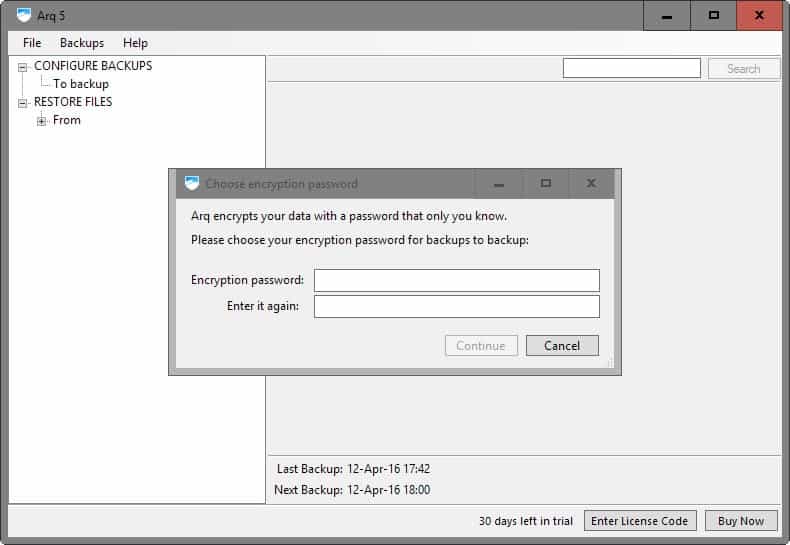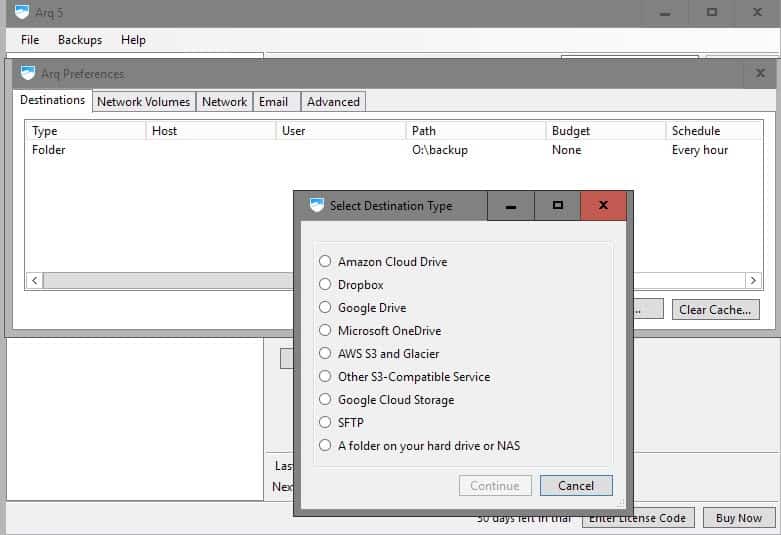Arq 5 Backup Software released

Arq 5 is a new version of the popular backup software for Macintosh and Windows systems that enables you to backup data locally or online using various methods.
The program is not free but available for a one-time fee of $49.99. You can add an extra $30 for that if you want free lifetime major version upgrades included.
While that is all that is needed if you want to use the software to back up data locally, you need to add costs if you plan to use remote services such as AWS, Dropbox, Google Drive, OneDrive, or Google Cloud Storage.
Arq 5 Review

You can test the program for 30 days before you need to make a decision on keeping it (and buying a license for it), or removing it from your system.
One of the first things the program will ask you is to enter an encryption password. Arq 5 uses the master password to encrypt the data before it leaves the computer to ensure that it cannot be read if someone else gains access to the online storage.
It is recommended to select a secure password to make sure that it cannot be brute forced in a reasonable amount of time.
All but local transfers happen over SSL/TLS on top of that to ensure data safety during the transport.
As mentioned earlier, you may select one of several online storage providers as backup destinations. What makes this interesting is that you can combine different types of backups. Here is an example:
Have Arq 5 back up documents, source code folders and pictures in one hour intervals to a network drive or local drive.
Configure a second backup job to save the data once per day to a cloud based service of your choosing so that you have local and remote copies should the need to restore data arise.

You do need an account or credentials depending on the service that you have selected for back ups. Depending on the account you have, you may pay for data that you transfer to it or for an account.
Arq 5 supports AWS S3 and Glacier for instance. The former charges $0.03 per Gigabyte per month while the latter $0.007 per Gigabyte per month.
One interesting feature is the ability to set a budget which limits the total size of backup.
The backup software backs up all files in folders that you select for jobs regardless of file size (provided that the destination has enough free space). It won't skip any files, and can back up data from external drives and network drives (Mac only).
Another thing that sets it apart from services such as Crashplan or Backblaze which may delete backups of hard drives that have not been connected for six months.
Other features that you may find interesting are options to limit the transfer rate and options to restore data to any computer.
One downside of using Arq 5 is that it offers no option to backup a partition or drive. This means that it cannot be used to restore a non-booting operating system for instance as it only supports file backups and restores.
What is new in Arq 5?
Probably the biggest change in Arq 5 is a switch from a per-computer to a per-user license model. This means that individuals need to buy one license to use Arq 5 on all their devices.
The backup software is faster than previous versions thanks to the use of LZ4 for compression, use of multiple threads to back up and restore data, and minimizes file scanning by using file system events whenever possible.
The built-in search enables you to find all file versions in all backups created so far, and gives you options to restore it easily using drag and drop.
Arq 5 let's you select specific wired and wireless network interfaces for data transfers (or block wireless transfers altogether), run scripts before and after jobs, and supports email reports that provide you with details on individual jobs.
Closing Words
Arq 5 is not the cheapest backup program but it may be an option depending on how much data you need to store online, how many computers you work with, and whether you want that data to be available forever (as long as you keep the account).
A one year Crashplan account sets you back $5 per month for instance for unlimited online backup to the cloud using one computer. That's only $10 more than what you pay for Arq 5 in the first year.
Now You: Where do you store your backups?



























Duplicati provides even more local and cloud back-end options than arq-5, and it’s Open Source and free – (although donations welcomed). Incremental file backup – not partition imaging.
Supported on Windows, Mac, and Linux, and has built-in AES encryption. Flexible job scheduling capabilities and VSS / LVM support to backup data from running applications.
I’ll take Arq over Duplicity (Duplicati backend) even though I’d much prefer Arq had a Linux version. Indeed, I’d prefer tarsnap, if I could use it without spending a bloody fortune on storage.
Why? Because duplicity invokes gpg as encryption backend. It’s fragile, as one might expect. If it works for you, great, but I think reliability is something I absolutely depend on for headless backups. YMMV.
I normally use SyncBack with encrypted hard drive for home based backups. Arq backup seems like an overkill for a soho setup.
Yep, Arq is awesome. It was the gold standard even when it emerged on the Mac.
And you’ll be glad to know that this blog was the first I’d heard about the upgrade, which just goes to show that you do have a Mac audience. :)
My backup solution is to copy-paste everything to a backup harddrive, then use CloneSpy to purge old backups of duplicate files. This gives me one complete recent backup and only very old files are in the very old backups. It may not be your “end user” solution, but it seems reliable.